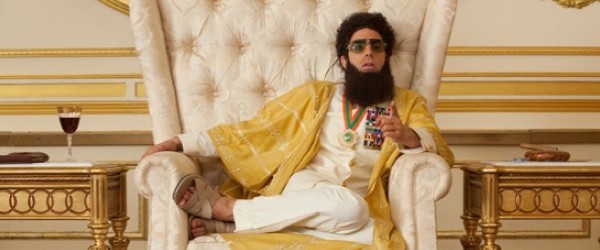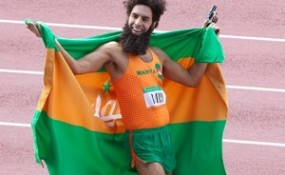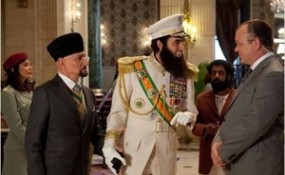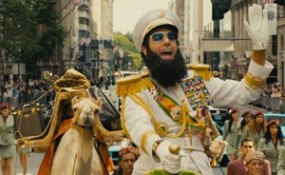
‘The Dictator’ Doesn’t Rule
Film, ReviewsSacha Baron Cohen should know better than anyone: laughs don’t come easy. Comedy is about balance and disorder, and the greater the stakes, the greater the payoff. With his series Da Ali G Show and his 2006 breakthrough hit Borat, Cohen became the master of his own comedic brand. By inserting his ludicrous caricatures into the ordinary lives of unsuspecting people, he was able to shock the common order to unbelievably hysterical results, like an avant-garde Candid Camera.
It worked because the stakes were so high – while watching Borat for the first time – in a theatre full of people in the throes of laughing fits – my thoughts kept straying from “Oh wow this is funny” to “Oh my god he’s actually going to get killed on camera – or at least arrested.” The unpredictable reactions of regular folk (and the occasional unwitting celebrity) to his extreme and absurd personas created moments of shock-comedy that have become indelible pop-culture moments. With The Dictator, Cohen has taken a personal risk by crafting a fully scripted narrative around a brand new character (that maintains his trademark agit-prop flair), and the results are less than thrilling.
The film follows the well-bearded Admiral General Aladeen as he goes through the plot arc that Cohen feels most comfortable with – clawing his way up from disgrace. The ruthless dictator, described by the film’s early promo material as having “risked his life to ensure that democracy would never come to the country he so lovingly oppressed,” journeys to New York City where he is betrayed by his right-hand man and left to fend for himself as an ordinary citizen. It’s like Coming To America starring Adam Sandler’s old Weekend Update character Iraqi Pete. There are obstacles and enemies and even romance, but all of the plot pieces of the film really just exist for Aladeen react to in lavishly offensive ways.
The Dictator had a lot of promise, which makes the sting of disappointment that much greater. The trailer lived up to the millions of views it quickly racked up upon its much-hyped winter release: despite some lazy, pandering gags (Kardashian jokes rubbing shoulders with AIDS references), Cohen’s Aladeen of the fictional north-African nation of Wadiya was gloriously ludicrous. A few publicity stunts – including an appearance on the Oscar red carpet, in which a costumed Aladeen spilled an urn full of what he claimed were the ashes of Kim Jong Il on host Ryan Seacrest – seemed to indicate that the film may have the same daring edge that made Cohen’s previous work the stuff of legend. But the film itself falls with a thud, which is a frustrating quandary for the viewer. It’s not that the film doesn’t have a clever concept, snappy jokes or a truly gifted performer at the helm – it’s that nothing is at stake. Aladeen says and does horrible, shocking things, but instead of naïve chumps being duped by a ruse that the audience is in on, we have a series of wholly unbelievable supporting characters reacting in wholly unbelievable ways. This contradicts the expectations that we have built as viewers of a Sacha Baron Cohen movie, and as such feels distinctly phony.
The first (and worst) culprit in the series of implausible supporting cast members is John C. Reilly as blowhard American stereotype Clayton, a secret service agent who is hired to kill Aladeen. Reilly’s overblown performance destroys the very balance that is required for Cohen’s characters to work. Cohen needs a straight man, and the straighter the world he is disrupting, the more effective he is. There is one bright spot for Reilly however: in one of the film’s cleverest scenes, Clayton prepares to torture Aladeen but is humiliated by the would-be victim for his out-of-date equipment. It’s a small glimpse of the smarter film that could have existed.
Anna Ferris’s hyper-PC organic grocery store owner should be Aladeen’s foil, but also falls victim to the same broad caricaturizing brush that paints every other one-dimensional character in the film. Had she been played with a shred of honesty, then there may have been a real opportunity to play with the warped value system of a hateful, power-mad dictator who has known nothing but total opulence his entire life. Instead her liberal Brooklynite is as cartoonish and clichéd as the evil Muslim.
But then the whole film is a series of missed opportunities: in clawing for quickest laugh it can get, The Dictator just makes cheap gags out of the contrasting value systems of liberal America and a simplified, evil Muslim superpower. It could have instead existed in the pocket of absurd reality that makes many modern dictators so funny; these ultra-powerful men are truly more detached from reality than Paris Hilton (pardon the cheap shot of my own.) Kim Jong-Il would broadcast tall tales about himself to his public that are far crazier than anything that ever comes out of Aladeen’s mouth – did you know he has convinced the population of North Korea that he invented the hamburger?
The Dictator reaches and reaches and ends up feeling most comfortable when relying on utterly juvenile shock tactics. I mean, there’s an impromptu childbirth scene, featuring several POV shots from inside the screaming woman’s vagina. Eventually the barrage of jokes about abortion, misogyny, torture and Islam becomes very easily dismissed, like the casual racism of a Family Guy episode. As with the ultra-gay Bruno or the confused-foreigner Borat of Cohen’s last two films, there’s a very grey area in the performer’s definition of satire that tends to lean closer to exploitation. By not challenging REAL people’s attitudes and fears of the Arab world, The Dictator becomes just as polemic and stereotype-enforcing as the severe media voices that I’m sure Cohen believes he’s jabbing at from the safety of political satire. By the time Aladeen makes his speech comparing the corporate/media oligarchy over America to his own reign as brutal tyrant, it’s far too late in the game for anything poignant. Chaplin’s The Great Dictator, it ain’t.
I think there still could be a really funny movie made about the unbelievably absurd and decadent lives of the few men in history who rule mercilessly over oppressed peoples, but The Dictator isn’t it. Sacha Baron Cohen knows that he is in need of reinventing his shtick, however he’s gone in the wrong direction. He needs to go smaller and more focused and worry less about getting one big shocking laugh when he could hold our amusement and stimulate our intellects with a little more care. I still have faith in him – as I’ve already stated, he’s a very gifted performer. Here’s hoping this misstep brings him back down to earth.


























